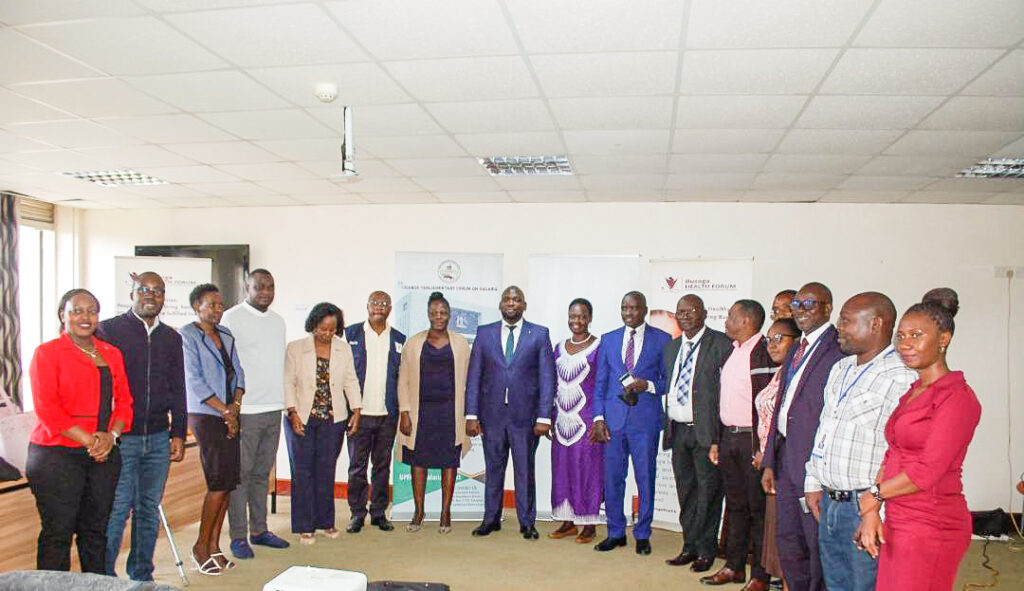By Elizabeth Namara
BUSOGA HEALTH FORUM: Busoga sub-region has for long been known as one of the regions with the highest malaria prevalence in the country. The malaria prevalence in the sub-region is significantly high at 21 per cent compared to the national prevalence.
The region is surrounded by water bodies and sugarcane plantations that offer fertile ground for the breeding of malaria-causing vectors.
Unfortunately, as Dr. Jane Nabakooza pointed out, malaria and poverty are intertwined and a reduction in malaria automatically leads to a reduction in poverty.
The districts in Busoga sub-region with the highest prevalence of malaria include; Bugiri, Buyende, Kamuli, Namutumba and Namayingo.
The national statistics show that malaria has continued to wreak havoc in the country. It has continued to negatively impact on the economy due to loss of workdays resulting from sickness, decreased productivity and school absenteeism.
It is upon this background that the Busoga Health Forum (BHF) carried out a malaria stakeholders’ meeting for the sub-region. The meeting was aimed at developing a regional framework for the fight against malaria that is in line with the Ministry of Health Malaria Strategic framework (2021-2025) that focuses on a malaria-free Uganda.

The key stakeholders in the meeting included; Obwakyabazinga Bwa Busoga, Uganda Parliamentary Forum on Malaria (UPFM), Ministry of Health National Malaria Control Program, Malaria Reduction Activity (MRA), RHITES -EC and district health officers, among others.
Dr. Jimmy Opigo, the Assistant Commissioner in charge of the National Malaria Control Division (NMCD), said malaria should remain a priority on everyone’s agenda, especially the district agenda. He challenged districts to take the lead in the fight against the scourge.
Mass Approach Against Malaria (MAAM) is the way to go as it calls for concerted effort in creating a malaria-free region.
Malaria prevention calls for the involvement of all stakeholders, including the household, parish, sub-county, constituency and district up to the regional and parliamentary levels.
“People’s perception about malaria should be addressed at the household level,” noted Chris Rwabwogo, the Regional Program Coordinator for the Uganda, MRA.
According to Rwabogo, communities are not effectively engaged in malaria prevention and treatment interventions.
“Communities are not fully engaged in malaria prevention. Each district has its unique issues and therefore requires tailored interventions,” he added.
Apart from the communities lackluster involvement, poor data collection and analysis, one-size-fits-all solutions that fail the districts from adapting malaria interventions to the local context, and the variations in the district’s ability to plan are some of the factors that are impeding the malaria fight.
Others are lack of funds to carry out different planned activities, rampant stockouts of malaria commodities, inactive district malaria task force and improper usage of mosquito nets.
Insecticide-treated mosquito net access and proper usage are lacking as people instead use the nets on nursery beds and for fishing.
Furthermore, community members complained about the nets being rough and unfavorable to use.
“Mosquito net prices are unaffordable for the common Ugandan. There is an urgent need for Parliament to regulate their prices if malaria is to be overcome. In addition, considering the fertility rate of the sub-region, the two nets per household seems like a joke,” Rwabwogo said.
Owek. Dr. Andrew Balyeku, the Minister of Health in the Obwakyabazinga Bwa Busoga, challenged the policymakers to ponder over why the Basoga are still being killed by malaria.
Understanding that the region is highly affected by sickle cell disease calls for vigorous efforts toward eradicating malaria.
“The biggest consumers of malaria drugs are sickle cell patients. We need to do something to change the situation,’” Owek. Balyeku explained.
In his remarks, Dr. Paul Waibale said districts are focusing on low-hanging fruits.
He urged district health officers to understand areas of common interest and base on them to fight the malaria scourge.
As part of efforts to eliminate malaria from the sub-region, the UPFM was tasked to advocate for a regional blood bank since malaria is one of the major causes of anemia.
Busoga Health Forum promised to be at the forefront of the fight against malaria by working directly with districts, the Health ministry, partners and donors. This will be done by making sure districts have malaria-focused plans, follow the Ministry of Health strategic plan and integrate it with what the donors have already earmarked.
The UPFM chairperson and Jinja West MP, Hon. Dr. Timothy Batuwa, assured the BHF members of support.
“We should at least be seen yielding to some of these targets we are committing to,” Hon. Batuwa emphasized.
Malaria majorly affects children under five years, pregnant women and people with immune deficiency conditions, among others.




